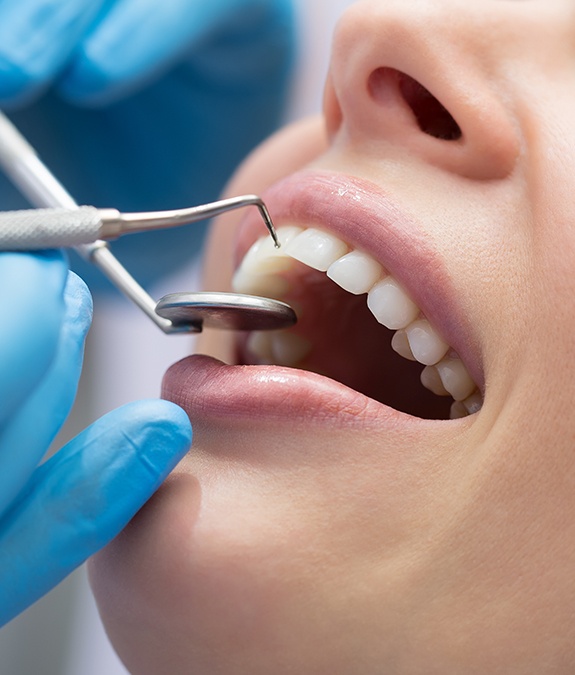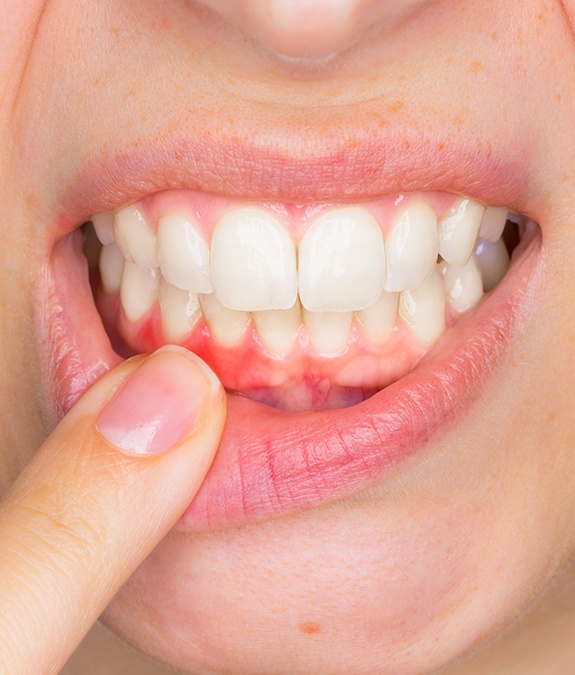Periodontal Therapy – Mansfield, TX
Put a Stop to Sensitive
& Bleeding Gums
While cavities certainly get a lot of attention in dentistry, did you know that the most common dental problem in the U.S. is periodontal (gum) disease? This infection attacks the soft tissues and underlying bone that support the teeth. Early symptoms are mild, but it can eventually result in tooth loss, and it’s actually the leading cause of adult tooth loss! Thankfully, we can take care of it here at Broad Park Family Dentistry before any lasting damage is done, so contact us today for periodontal therapy in Mansfield, TX if you or a loved one have any concerns about your gums.
Why Choose Broad Park Family Dentistry for Periodontal Therapy?
- Thorough Gum Screenings at Every Appointment
- Scaling & Root Planing That Remove the Source of Infection
- Antibiotic Therapy: Professional Strength Treatment You Can Use at Home
Scaling & Root Planing

If gum disease is caught relatively early, it can usually be remedied with diligent oral hygiene at home and more frequent dental cleanings at our dental office. For more advanced cases, we can use scaling to remove harmful bacteria from below the gum line and root planing to smooth out the roots of the teeth. Together, they stop an infection in its tracks, start the healing process, and prevent reinfection from occurring.
Antibiotic Therapy

In addition to scaling and root planing, we may also apply a topical antibiotic to the gums that dries on contact, then slowly dissolves over the next few days. This allows the powerful medicine to reach the inside of periodontal pockets, which are small, hard to reach spaces between the gums and teeth that tend to harbor bacteria. In addition to eliminating this bacteria, the antibiotic can also reduce the size of these pockets, lowering the risk of gum disease coming back.
What is Periodontal (Gum) Disease?

You’ve likely heard the phrase “gum disease” in ads for toothpaste and mouthwash, but what is it? When bacteria is allowed to buildup in your mouth, it can start to damage your tooth enamel, which is what causes cavities. It can also accumulate below the gum line and irritate and inflame the soft tissues and nearby bone. Over time, the infection will start to break them down, leading to a variety of unpleasant symptoms that ultimately result in tooth loss.
What Are the Symptoms of Gum Disease?

There are two main types of gum disease: mild (gingivitis) and advanced (periodontitis). An infection that starts as gingivitis will turn into periodontitis if left untreated. Many initial symptoms are hard to notice, but over time, they become very difficult to ignore:
- Red, swollen, & puffy gums
- Sensitive gums
- Gums that bleed easily during normal hygiene
- Gum recession (gums pull back from the teeth)
- Pockets of bacteria forming along the gum line
- Chronic bad breath that doesn’t go away
- Loose & unstable teeth
What Causes Periodontal (Gum) Disease?

The primary cause of gum disease is the same as cavities—a lack of oral hygiene. Other factors can increase someone’s risk, including behaviors like using tobacco (smoking and chewing), vaping, drinking alcohol regularly, and consuming a diet that contains a lot of sugary and starchy foods. Genetics play a role as well, and people with diabetes are also more susceptible to developing oral infections.
How Gum Disease Impacts Your Overall Health

Recent research has revealed that when a person has gum disease, their risk for serious general health conditions, including diabetes, heart disease, and dementia, dramatically increases compared to the general population. The existing theory is that the bacteria responsible for gum disease is able to enter the bloodstream, travel throughout the body, and damage other organs. So, by taking care of your mouth, you’ll be giving yourself not just a healthy smile, but a strong body as well! This is just another reason not to miss out on your regular checkups and cleanings.







